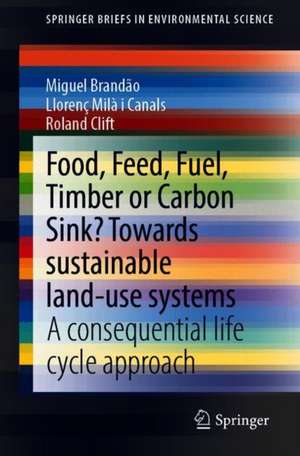Food, Feed, Fuel, Timber or Carbon Sink? Towards Sustainable Land Use: A Consequential Life Cycle Approach: SpringerBriefs in Environmental Science
Autor Miguel Brandão, Llorenç Milà i Canals, Roland Cliften Limba Engleză Paperback – 16 apr 2021
This book provides a holistic framework for assessing the environmental and economic impacts of land-use strategies for a range of purposes, such as food, animal feed, biomass and biofuels, and timber.
Using land for one purpose negates its use for any other competing purpose. Given that it is in limited supply, land needs to be optimised so that it can meet the increasing demand for crops of a growing and wealthier human population, while providing ecosystem services, such as carbon storage (i.e. climate-change mitigation).
The framework is quantitative and includes various indirect effects, like indirect land-use change, and is a robust basis with which to assess global impacts from land-use decisions on climate change, ecosystem services and biodiversity.
Din seria SpringerBriefs in Environmental Science
-
 Preț: 348.77 lei
Preț: 348.77 lei -
 Preț: 382.57 lei
Preț: 382.57 lei -
 Preț: 378.12 lei
Preț: 378.12 lei -
 Preț: 378.80 lei
Preț: 378.80 lei -
 Preț: 381.98 lei
Preț: 381.98 lei -
 Preț: 347.80 lei
Preț: 347.80 lei -
 Preț: 378.12 lei
Preț: 378.12 lei -
 Preț: 377.53 lei
Preț: 377.53 lei -
 Preț: 379.09 lei
Preț: 379.09 lei -
 Preț: 381.00 lei
Preț: 381.00 lei -
 Preț: 383.93 lei
Preț: 383.93 lei -
 Preț: 175.58 lei
Preț: 175.58 lei -
 Preț: 475.83 lei
Preț: 475.83 lei -
 Preț: 380.07 lei
Preț: 380.07 lei -
 Preț: 378.92 lei
Preț: 378.92 lei -
 Preț: 411.93 lei
Preț: 411.93 lei -
 Preț: 375.62 lei
Preț: 375.62 lei -
 Preț: 375.45 lei
Preț: 375.45 lei -
 Preț: 378.92 lei
Preț: 378.92 lei -
 Preț: 377.57 lei
Preț: 377.57 lei -
 Preț: 377.35 lei
Preț: 377.35 lei -
 Preț: 378.34 lei
Preț: 378.34 lei -
 Preț: 344.67 lei
Preț: 344.67 lei -
 Preț: 374.30 lei
Preț: 374.30 lei -
 Preț: 362.43 lei
Preț: 362.43 lei -
 Preț: 446.26 lei
Preț: 446.26 lei - 5%
 Preț: 361.96 lei
Preț: 361.96 lei -
 Preț: 376.43 lei
Preț: 376.43 lei -
 Preț: 380.63 lei
Preț: 380.63 lei -
 Preț: 375.84 lei
Preț: 375.84 lei - 15%
 Preț: 463.20 lei
Preț: 463.20 lei -
 Preț: 383.33 lei
Preț: 383.33 lei -
 Preț: 375.23 lei
Preț: 375.23 lei -
 Preț: 377.57 lei
Preț: 377.57 lei -
 Preț: 381.59 lei
Preț: 381.59 lei -
 Preț: 379.48 lei
Preț: 379.48 lei -
 Preț: 376.04 lei
Preț: 376.04 lei -
 Preț: 413.84 lei
Preț: 413.84 lei -
 Preț: 381.81 lei
Preț: 381.81 lei -
 Preț: 352.28 lei
Preț: 352.28 lei -
 Preț: 381.81 lei
Preț: 381.81 lei -
 Preț: 381.98 lei
Preț: 381.98 lei - 5%
 Preț: 331.65 lei
Preț: 331.65 lei -
 Preț: 375.62 lei
Preț: 375.62 lei -
 Preț: 377.95 lei
Preț: 377.95 lei -
 Preț: 413.45 lei
Preț: 413.45 lei -
 Preț: 267.16 lei
Preț: 267.16 lei -
 Preț: 373.72 lei
Preț: 373.72 lei -
 Preț: 375.62 lei
Preț: 375.62 lei
Preț: 464.18 lei
Preț vechi: 546.09 lei
-15% Nou
Puncte Express: 696
Preț estimativ în valută:
88.82€ • 92.73$ • 73.51£
88.82€ • 92.73$ • 73.51£
Carte disponibilă
Livrare economică 15-29 martie
Preluare comenzi: 021 569.72.76
Specificații
ISBN-13: 9789402420975
ISBN-10: 9402420975
Pagini: 125
Ilustrații: VIII, 125 p. 40 illus., 28 illus. in color.
Dimensiuni: 155 x 235 x 25 mm
Greutate: 0.23 kg
Ediția:1st ed. 2021
Editura: SPRINGER NETHERLANDS
Colecția Springer
Seria SpringerBriefs in Environmental Science
Locul publicării:Dordrecht, Netherlands
ISBN-10: 9402420975
Pagini: 125
Ilustrații: VIII, 125 p. 40 illus., 28 illus. in color.
Dimensiuni: 155 x 235 x 25 mm
Greutate: 0.23 kg
Ediția:1st ed. 2021
Editura: SPRINGER NETHERLANDS
Colecția Springer
Seria SpringerBriefs in Environmental Science
Locul publicării:Dordrecht, Netherlands
Cuprins
1. Introduction.- 2. Sustainability of Land Use: A Systems Approach.- 3. Consequential life cycle framework and methodology for the integrated sustainability impact assessment of land-use systems.- 4. Discussion and Conclusions.
Notă biografică
Dr. Miguel Brandão is Associate Professor in Industrial Ecology and Life Cycle Assessment at KTH, Stockholm. Over the last 15 years, he has taught and researched at a number of organisations around the world. He works with the use of hard systems approaches that can robustly support decisions towards sustainable development. His research has focused on the integrated assessment of bio-based systems, with emphasis on their impacts on climate change, resource depletion, ecosystem services and biodiversity.
He is involved in international standardisation initiatives in the areas of life cycle assessment, circular economy and climate-change metrics.Interests: Circular Economy, Environmental Economics, Ecological Economics, Agroecology, Land Use, Sustainable Production and Consumption, Globalisation, Poverty alleviation, Food Security, Bioenergy, Food.
He is an editor in the Journal of Industrial Ecology, the International Journal of Life Cycle Assessment, Sustainability and Cleaner Environmental Systems. In 2012, he received the SETAC Europe Young Scientist LCA Award.
Dr. Llorenç Milà i Canals is the Head of the Secretariat of the Life Cycle Initiative, based in Paris. He joined UN Environment to lead its life cycle thinking work in 2013, after working in academia and industry. The Life Cycle Initiative is a multi-stakeholder partnership launched in 2002 and hosted by UN Environment, with the aim of enabling the global use of credible life cycle knowledge by private and public decision makers.
His main area of expertise is environmental assessment of products, focusing on Life Cycle Assessment (LCA) and its application on the implementation of sustainable business and policy models.
Professor Roland Clift is Emeritus Professor of Environmental Technology at the Centre for Environment and Sustainability, University of Surrey. His role as a leading thinker on sustainable development has been recognised through the awarding of IChemE's highest honour, the George E Davis Medal.
Caracteristici
Presents framework to assess land-use Offers solutions for land-use policy development Helps identify the most sustainable land-use strategies on a global level Offers a holistic framework for assessment of land-use impacts on environment and economy
